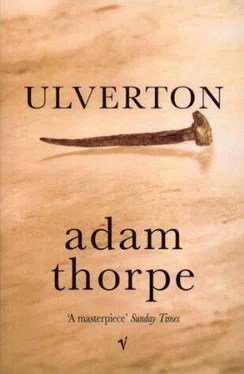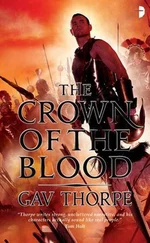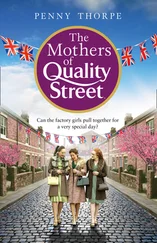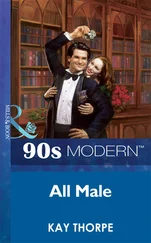A few days after the first of our finds, or a few days after the declaration of war — on whichever hook the reader would prefer to hang that 4th of August — the sound of hammering resounded around the square in Ulverton, small children with hoops (as much in fashion then as now, I seem to recall) gathered in knots about the personage hammering, and some of them shouted out, as best they could, the words RECRUITMENT and MEETING. This meaning nothing to them, they ran to the fields to tell their parents or elder siblings, who — being waist-deep in docks and thistles, et cetera — told them to be gone (if in less delicate and probably unprintable terms), thus returning the children posthaste to the elusive source, whose polysyllabic mysteries were stared at on the basis of the same principle that had the unlettered Charlemagne sleeping with the Bible beneath his pillow: knowledge may be yielded up by sheer proximity.
Thus it was that, returning from the excavation somewhat earlier than usual, owing to a mild attack of heat-stroke, I was accosted by piping voices, and explained as best I could to the gathered throng of dirty knees and faces and dirtier skirts (the recent habit of dressing little boys in boys’ garments was not yet taken up in 1914) the meaning of RECRUITMENT; while the elders of the village, some of whom must have been familiar with the King’s shilling, looked on with their customary suspicion at the newcomer’s lofty cognisance of things beyond the Fogbourne vale.
Suffice to say that explaining to those little scruffy beings the principles of our conduct of war, which necessitates the calling forth of suicidal impulses, and the separation of husband from wife, son from mother, brother from sister, but most especially alarming in their eyes, father from child, was not the easiest task allotted to me, and quite surpassed the stickiest situation ever encountered in India. One charming little fellow, by the name of Stephen Bunce, hand in hand with his minuscule sister, stared up at me with such a profound look of innocence on his wee face that tears all but sprang to my eyes as I talked. That this onerous task was given to me at all is still to be regretted, for ever since (I feel) those same children have looked upon me as some kings in ancient plays look upon the Messenger: as somehow culpable of the havoc he brings news of. Though they are now (even the innocent little Stephen) all large and lusty and grown-up, it is not just my outsider complex that causes me to feel a chill, a little shiver of hatred and blame, as one of them passes me in the lane. Now imagine that sense increased tenfold, twentyfold, in the friable mind of the Squire — but the reader will perceive I am jumping ahead.
In the days before the meeting, only one urn and a small food vessel were uncovered from the newly-exposed layers of the barrow, but anticipation, and the hypnotic rhythm of the trowels, somehow made talk of the war superfluous. The last was a general blur of excitement and dread; this was a carefully delineated reality. Indeed, I would sleep at night with the same patch of chalky earth revolving before my eyes in vivid proximity and detail, with the mournful calls of peewits still sounding in my ears. It was at least an improvement on shakily bobbing fans and the bloated corpses of dogs.
The meeting, taking place just before harvest, was attended by the whole village. In those days, as now, long evenings in cramped cottages (or on its back-door step in the summer) were eagerly broken. The piano’s wrong notes grow increasingly intrusive, the gramophone loses its appeal with its frozen repertoire, and the crystal set had not yet appeared to while away useless hours upon, fiddling with a cat’s whisker! The same greasy cards snap dully on the same dark tables, the same brass ring swoops to clink against the same worn horn, while the clay-pipes and the gallon jugs have to be filled in the proverbial sweat of hay-prickled brows — and the songs and recitations cannot always be paying. Come the end of the summer months the whole village (though now there are rumours of electrification) crouches in a paraffin-flickering tedium — for books have not yet dispensed their eternal treasures in the majority of our homes. Staring into the fire links us, surely, with our primitive ancestors, for no other occupation was then, or is now, so heavily resorted to.
A small podium had been erected in the middle of the square, with a bleached Union Jack (our Women’s Institute has it now) draped across the front. Three chairs and a table occupied most of the dais, and when the Squire, the Vicar, and a militarily uniformed gentleman stepped up together, there was a brief toppling of furniture. The local photographer was hopping about attempting to keep a space in front of him clear of the crowd, and the local constable was ingratiating himself with a second uniformed gentleman. Three rows of chairs were positioned at one side for the higher echelons of the village, rather like boxes in the theatre, and perceiving myself to be one of this division I sat down. Children were tugging at skirts, hoops were clattering, a group of men in smocks were guffawing, and the church bell proceeded to join in with the quarter. The elders were gathered on benches before the New Inn, and they nodded and talked all the way through the booming nonsense of the first uniformed gentleman; while the crowd, I am sorry to say, gawped most impressively.
Feeling a thirst come on in the warm dusk, I glanced towards the inn as if a mere glance would appease, and saw, with an unwarranted jolt of the soul, the Manor’s under-gardener leaning against the oak that grows outside that establishment, and shelters it, with a jug in one hand and a tankard in the other. Something about him puzzled me, and when the Vicar rose in turn and declaimed his own piping version of nonsense, I realised what it was: Percy Cullurne was watching, not the contents of the podium, but something above and beyond it. Turning surreptitiously about in my chair, I saw what it was: a house-martin busy in its nest in the eaves of the Post Office, flashing that tell-tale white patch as it swooped and scurried. I fancied I saw a smile upon the face of Percy Cullurne, but he was just too far the other side of the square for me to be absolutely certain.
When the Vicar had sat down to desultory applause, the Squire stood up and I forced myself to listen. I was keen to know how the Chief would handle his mission. During the week or so of the excavation, I had grown quite fond of him. One cannot help but grow fond of men with whom one is in physical concord, with whom a simple labour is being undertaken, an end met, and with whom few words serve. This is the other side of that useless and ghastly custom called War: companionship forged harder than iron in the heat of battle, in the slow fire of wounds and deprivation. I fancy, too, that those old men outside the ale-house, in almost permanent agonies from various rheumatic complaints brought on by their lifelong exposure to cold and wet, some crippled by the sheer weight of the work they had endured and mastered, had an unspoken bond amongst themselves, that thrilled more to silence than words, and might be recalled next time the reader enters an ale-house in the country, and thinks himself in the company of dumb idiots.
The Squire was sporting a white blazer and trousers, with a gold watch hanging lustrously from his white waistcoat. The crowd were mostly in their Sunday best, so that the scene resembled an old sombre painting of, say, St Michael before a host of sinners. Nothing about the Squire betokened a military demeanour: his shape was that of a William pear, his pince-nez sported a red silk ribbon, his hair was mounted above his head in two polished waves either side of a deep trough, each wave ending in a small curl over the forehead. His hands were small and his feet likewise, but they were the only dapper parts: there was a general air of dissipation about him, most especially in the creamy pallor of his face, which blurred the edge of neatness and admonished his attempts at moral heartiness. His vigorous fury spluttered with an element of indignation, lacking the cool deadliness of the true autocrat. He struggled against himself as much as his perceived enemies, but without that essential intelligence that might have allowed him to grow in stature and self-knowledge. In short, he was the model of an English country gentleman of those pre-war years — and he was (almost) never hateful.
Читать дальше










